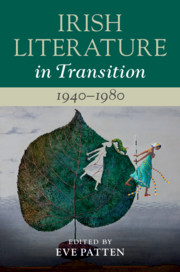Book contents
- Irish Literature in Transition, 1940–1980
- Irish Literature in Transition
- Irish Literature in Transition, 1940–1980
- Copyright page
- Contents
- Contributors
- Series Preface
- General Acknowledgements
- Introduction
- Part I After the War: Ideologies in Transition
- Part II Genres in Transition
- Part III Sex, Politics and Literary Protest
- Part IV Identities and Connections
- Part V Retrospective Frameworks: Criticism in Transition
- Chapter 17 Literary Biography in Transition
- Chapter 18 Publishing, Penguin and Irish Writing
- Chapter 19 Curriculum to Canon: Irish Writing and Education
- Chapter 20 Critics, Criticism and the Formation of an Irish Literary Canon
- Index
Chapter 20 - Critics, Criticism and the Formation of an Irish Literary Canon
from Part V - Retrospective Frameworks: Criticism in Transition
Published online by Cambridge University Press: 28 February 2020
- Irish Literature in Transition, 1940–1980
- Irish Literature in Transition
- Irish Literature in Transition, 1940–1980
- Copyright page
- Contents
- Contributors
- Series Preface
- General Acknowledgements
- Introduction
- Part I After the War: Ideologies in Transition
- Part II Genres in Transition
- Part III Sex, Politics and Literary Protest
- Part IV Identities and Connections
- Part V Retrospective Frameworks: Criticism in Transition
- Chapter 17 Literary Biography in Transition
- Chapter 18 Publishing, Penguin and Irish Writing
- Chapter 19 Curriculum to Canon: Irish Writing and Education
- Chapter 20 Critics, Criticism and the Formation of an Irish Literary Canon
- Index
Summary
This chapter considers the evolution from the 1940s to 1980 of what was initially constructed by Daniel Corkery and others as ‘Anglo-Irish literature’, and its serial problems of inclusion and definition. In particular, it examines the shifting approaches to literary criticism from Seán O’Faoláin’s articles in The Bell to the Crane Bag and Field Day pieces by Seamus Deane in the 1970s and early 1980s. It opens with a discussion of the criticism which emerged in the 1940s and 1950s from Richard Ellmann and W. Y. Tindall, before discussing contributions made to the magazine Studies by Denis Donoghue, Vivian Mercier and Donald Davie, with varying degrees of attachments to New Criticism. This develops into an analysis of the polemical criticism of the 1960s by those such as Conor Cruise O’Brien, before discussing the foundation of the International Association for the Study of Anglo-Irish Literature in 1970, which became a platform for women academics but did not deviate from a general focus on canonical male authors. It concludes by discussing the Troubles-shadowed 1970s criticism of later Field Day critics like Deane and Terence Brown, with the former in particular interrogating literature to reveal its imbrication in what he insisted was a colonial condition.
Keywords
- Type
- Chapter
- Information
- Irish Literature in Transition, 1940–1980 , pp. 359 - 376Publisher: Cambridge University PressPrint publication year: 2020

